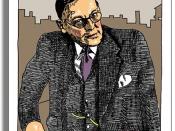Life is occupied by waiting. In Waiting for Godot, Samuel Becket presents the suffering of the human condition. Godot is about two beings who talk about nothing, experience the drudgery of life, complain that they do not do anything, meet a few people, think about hanging themselves, and then do it all over again. The existentialist style by Godot is comparable to T.S. Eliot's works. Eliot's Love Song of J. Alfred Prufrock, and Hollow Men are about the tormenting cycle of life and death. The connection among these three works is that people want to and should do so much, but they do not.
Waiting for Godot takes place in a rural area, with just a tree in the background. The two friends Vladimir and Estragon talk aimlessly and complain about life. They consider hanging themselves, but realize before they do that they should consult with Godot. Who or what Godot symbolizes remains a mystery, but their whole existence seems to be to wait for Godot.
They meet a couple of fellows: Pozzo, an upper-class man, mistaken by Vladimir and Estragon as Godot, and Pozzo's slave, Lucky. After they leave, a messenger from Godot arrives and states simply that Godot will arrive tomorrow, same place, same time. They consider leaving, but do not. The second act is almost an exact repeat of the first, but Lucky and Pozzo have fallen upon hard times. Pozzo has become blind and pathetic, and Lucky has become dumb. This change in events is a direct point of life being terrific one moment, and worthless the next. Godot never shows up. The play ends with the two considering to go somewhere, but they do not.
The similarity of this play to Eliot's poem is remarkable. Eliot's Love Song is in the first person...


